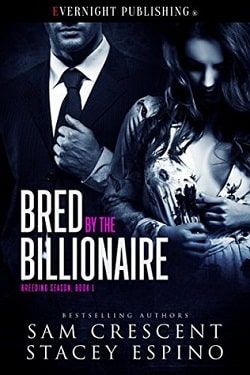Page 51 of Going Home in the Dark
“Really? A midlife crisis?”
“It’s nothing to be embarrassed about. They say that all men get there eventually. And you misread me if you believe I think this impromptu party is absurd or disturbing. I’m charmed by it,” Bobby lied without remorse.
“You are? Charmed?”
“Very much so. When the day comes that I stop traveling for research and inspiration, I’ll come home to Maple Grove andsettle down here. Everything so pretty, little or no crime, neighbors so affectionate and caring—what could be more appealing?”
Weber put on a look of suspicion. “When you slipped out of the party—”
“I hadn’t been here in twenty years. I misremembered the layout of the house and thought this was the powder bath.”
“You thought it was the powder bath?”
“Absolutely.”
“So you don’t find anything off-putting about the people out there?”
“Good heavens, no. They’re delightful. You must be under too much stress with those code-writing deadlines, Warren.”
“I guess maybe I am. Sometimes I’m at it seven days a week.”
“All work and no play makes Jack a little neurotic. What’re we doing, dawdling here like this? Come on, let’s get out there where the fun is.”
As gullible as required by his limited function in this quirky story, Warren Weber smiled. The tension went out of him. His irises contracted, and his pupils became smaller, as they should have been in the bright lights of the laundry room.
In the rest of the ground floor of the house, the celebration was raging. The Nelsoneers received Bobby as if they had seen him and enjoyed his company every day of their lives and perhaps even before. They clapped him on the back and hugged him and pinched his cheeks and offered him ice tea as he made his way through the crowd in search of his amigos.
In the living room, encircled by ebullient onlookers, Spencer and Rebecca were sitting in folding chairs at a small round table, arm wrestling.
29Ernie behind the Foldaway Bed
He was pretty sure he wasn’t dead. He hadn’t met God yet or even Saint Peter. If he was dead, what were they waiting for? Ernie didn’t know what the afterlife would be like—nobody knew—but he was sure it wouldn’t be a giant bureaucratic mess like the United States government, with millions of dead people lying around in a state of suspended animation, waiting for clerks to get back from gossipy conversations in the break room so that papers could be processed and the multitudes of newly arrived souls could rise up and be sent off to whatever corner of Paradise was assigned to them.
He could not feel, see, smell, or taste anything. You might think he would be frightened or at least anxious and impatient, but he was not. Although he wasn’t able to hear anything of the world where he had lived for thirty-five years, now and then one of two voices would speak to him. They were soothing voices with a musical quality, one male and the other female, reassuring him that he was well and everything would be all right in time. They were Prozac voices, keeping him mellow and patient.
Rarely, a third voice intruded—deep, rough, ominous. It was not friendly like the others. It said things such as, “You belong to us, you useless worm,” and “We will have your brain,” and “We will kill all your kind, burst upon you, and eat you alivefrom the inside out.” Because he currently lacked the ability to run and hide, these verbal assaults would have distressed Ernie if the unknown maker of the threats had not always been abruptly silenced in mid rant, as though someone disconnected or deplatformed him.
Immediately after such an event, one or the other of the two soothing voices would assure him that he was loved, safe, and of such great value that he would never suffer. He was told that the threatening presence was “of a different genotype from us,” whatever that meant. He was informed that the thuggish speaker was “millennia younger than we are and less wise, lacking the intelligence and the means to carry out their stupid threats.” He was promised that he would eventually arise and return to life as he had known it. Ernie believed everything these reassuring voices told him; both the male and female speakers were too kind, caring, and convincing to be disbelieved.
Because he never slept in his current condition, he might have been bored if he hadn’t filled the hours by writing country songs. Several had the potential to be hits; even if they failed, they were worth composing because they were certain to irritate his mother. He needed no pen and paper to write the lyrics, nor did he require a guitar or piano to fashion the melodies. He had perfect pitch; when he thought of the notes, he could hear them. He visualized the tunes on sheet music, and with his eidetic memory, he could summon those staff degrees at will. Among the tunes he composed in the last few days were “I Drank My Way out of Her Heart” and “Cheaters Don’t Play Cards in Heaven” and “Drape My Casket in Old Glory.”
30Shaken by Events at Spencer’s House, the Amigos Return to Adorno’s for Lunch
The thoughtful Nelsoneers had laid out an enormous buffet at Spencer’s house, but the three amigos had been kept too busy to eat anything during the five hours they had been captive at that event. Much ice tea had been forced on them, but at 2:00 they were in need of something they could chew.
Although Adorno’s had changed to a ristorante from a pizzeria since they hung out in this place as teenagers, it hadn’t undergone another transformation since they’d dined here the previous evening, even though this was a century of frantic change. As far as Rebecca could tell, the decor was exactly the same, as was the menu.
Vito didn’t work the lunch shift. Their waitress was a blue-eyed blonde named Gabriella, or so the management would have you believe.
Because they had a busy evening of law-breaking ahead, the amigos didn’t have wine. They ordered lunch. After Gabriella took their order, she said, “Ms. Crane, the first two seasons ofEnemieswere the best thing on TV at the time, and you were really great as Suzy Pepper. You sure deserved those Emmys.”
Although seven seasons of the show had aired, Rebecca was wise enough not to seek an opinion of the other five. She said, “That’s very sweet of you. You’re a lovely girl. Listen, dear, I’m a curious nebbynose. Do you mind telling me your last name?”
“Roccofino.”
“Gabriella Roccofino. Your married name, I assume.”
“No. I haven’t been married yet. But I’m engaged. He’s a great guy. Salvatore Passatempo. I want to have six kids.”















